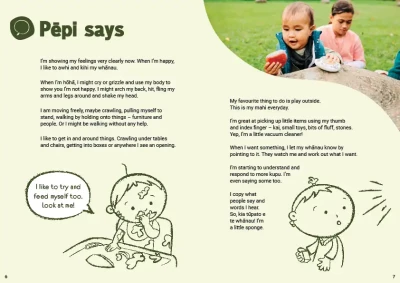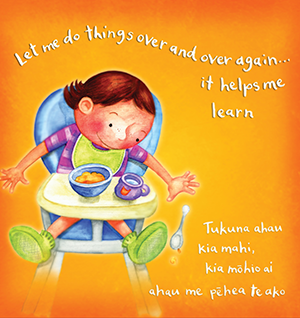
Using hands and fingers
Toddlers gain more control over their fingers and pick up things to put in their mouth. This can be food or more dangerous items, so parents need to take care.
Picking things up
As babies move into toddlerhood, they’ll gain more control over the small muscles in their fingers and hands as their fine motor (small muscle) skills mature. This helps them learn to feed themselves finger foods, but can also create additional safety worries for whānau. Choking risks increase as they can now pick up the smallest of items, and they’ll continue to put whatever they’ve picked up into their mouths.
In Whakatipu Te Pihinga 3 (page 7), pēpi says: ‘I’m great at picking up little items using my thumb and index finger — kai, small toys, bits of fluff, stones. Yep, I’m a little vacuum cleaner!’
Ask whānau:
- What is your child interested in lately?
- What do they pick up using their pincer grasp?
- What toys or activities do you have that might require them to use their pincer grasp?
Normal, not naughty
At this age children have limited understanding of what’s acceptable to go into their mouths and what isn’t. Parents may misinterpret this as ‘naughty behaviour’ rather than what it really is – an expected developmental milestone.
Talk about why a young child naturally puts things into their mouths to explore – they aren’t hungry or being naughty.
Conversation ideas
Helpful resources for whānau
-
Messy play
Ministry of Education
Messy play gives children the opportunity to experience a wide range of sensory experiences.
-
Manipulative play
Ministry of Education
Ideas for manipulative play from the Ministry of Education. Manipulative play refers to activities where children move, order, turn or screw items to make them fit.












